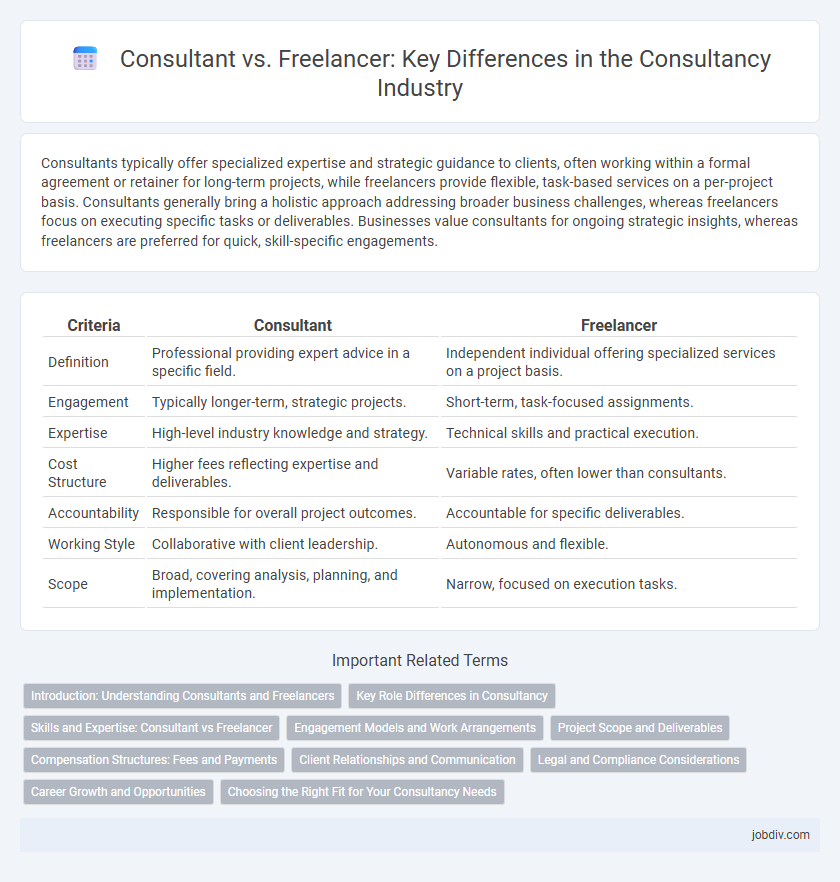Consultants typically offer specialized expertise and strategic guidance to clients, often working within a formal agreement or retainer for long-term projects, while freelancers provide flexible, task-based services on a per-project basis. Consultants generally bring a holistic approach addressing broader business challenges, whereas freelancers focus on executing specific tasks or deliverables. Businesses value consultants for ongoing strategic insights, whereas freelancers are preferred for quick, skill-specific engagements.
Table of Comparison
| Criteria | Consultant | Freelancer |
|---|---|---|
| Definition | Professional providing expert advice in a specific field. | Independent individual offering specialized services on a project basis. |
| Engagement | Typically longer-term, strategic projects. | Short-term, task-focused assignments. |
| Expertise | High-level industry knowledge and strategy. | Technical skills and practical execution. |
| Cost Structure | Higher fees reflecting expertise and deliverables. | Variable rates, often lower than consultants. |
| Accountability | Responsible for overall project outcomes. | Accountable for specific deliverables. |
| Working Style | Collaborative with client leadership. | Autonomous and flexible. |
| Scope | Broad, covering analysis, planning, and implementation. | Narrow, focused on execution tasks. |
Introduction: Understanding Consultants and Freelancers
Consultants typically provide expert advice and strategic guidance within specialized industries, often collaborating closely with organizations to improve business processes and outcomes. Freelancers offer flexible, project-based services across diverse fields, working independently with multiple clients without long-term commitments. Distinguishing these roles helps businesses select the right expertise for tailored solutions or short-term tasks.
Key Role Differences in Consultancy
Consultants provide strategic advice and tailored solutions to improve business processes, often working within structured frameworks and long-term projects. Freelancers deliver specific tasks or projects with a focus on operational execution, usually with more flexible and short-term engagements. Key role differences include consultants' emphasis on diagnostic analysis and organizational impact versus freelancers' specialized skill application and task completion.
Skills and Expertise: Consultant vs Freelancer
Consultants typically possess specialized skills and extensive industry expertise, often acquired through advanced education and years of professional experience, enabling them to provide strategic insights and tailored solutions to complex business challenges. Freelancers offer flexible, project-based skills that adapt to diverse client needs, focusing on execution and immediate deliverables rather than long-term strategic planning. The depth of knowledge and scope of service distinguish consultants as experts in advisory roles, while freelancers excel in delivering specific, task-oriented skills efficiently.
Engagement Models and Work Arrangements
Consultants typically operate within structured engagement models such as retainers, fixed-price contracts, or time and materials agreements, providing strategic guidance and long-term value to businesses. Freelancers usually engage through more flexible, project-based or hourly arrangements, focusing on specific deliverables with less involvement in overall business strategy. Work arrangements for consultants often include embedded roles within client teams, whereas freelancers tend to work independently or remotely with multiple clients simultaneously.
Project Scope and Deliverables
Consultants typically manage broad project scopes with clearly defined deliverables tailored to client objectives, ensuring comprehensive solutions and strategic outcomes. Freelancers often handle narrower tasks within specific project segments, focusing on delivering specialized outputs with limited scope and timeframe. The distinction in project scope and deliverables impacts resource allocation, communication flow, and overall project management approaches in consultancy engagements.
Compensation Structures: Fees and Payments
Consultants typically charge fixed fees or retainers based on project scope, expertise, and duration, providing predictable compensation structures for clients. Freelancers often work on hourly rates or per-task payments, allowing for flexible but variable income streams. Understanding these distinctions helps clients select appropriate payment models aligned with project needs and budget constraints.
Client Relationships and Communication
Consultants typically establish long-term client relationships with structured communication protocols, ensuring consistent project oversight and strategic alignment. Freelancers often engage in short-term assignments with flexible communication, prioritizing task completion over ongoing client integration. Effective client relationship management in consultancy enhances trust and project success, while freelancers rely on adaptability and clear deliverables.
Legal and Compliance Considerations
Consultants typically operate under formal contracts with clear legal terms, offering liability protection and compliance with industry regulations, whereas freelancers often work on a project basis with less structured agreements, increasing potential legal risks. Compliance considerations for consultants include adhering to data protection laws, intellectual property rights, and industry-specific regulations, which may not be as rigorously managed by freelancers. Engaging a consultant usually involves thorough vetting processes and contractual obligations to mitigate compliance issues, unlike freelancers whose informal arrangements may lack comprehensive legal safeguards.
Career Growth and Opportunities
Consultants typically experience structured career growth through progressive project leadership, access to extensive professional networks, and continuous skill development provided by consultancy firms. Freelancers gain flexibility and potential higher earnings by selecting diverse projects but face challenges in consistent career advancement and limited access to large-scale opportunities. Choosing between consultancy and freelancing depends on preferences for stability, professional mentorship, and long-term career trajectory versus autonomy and entrepreneurial growth.
Choosing the Right Fit for Your Consultancy Needs
Consultants offer specialized expertise and strategic insights tailored to long-term business goals, ideal for complex projects requiring sustained collaboration. Freelancers provide flexible, cost-effective solutions for specific tasks or short-term assignments, perfect for companies seeking quick, independent support. Assess your project scope, budget, and desired level of engagement to determine whether a consultant's comprehensive approach or a freelancer's agility best suits your consultancy needs.
Consultant vs Freelancer Infographic

 jobdiv.com
jobdiv.com